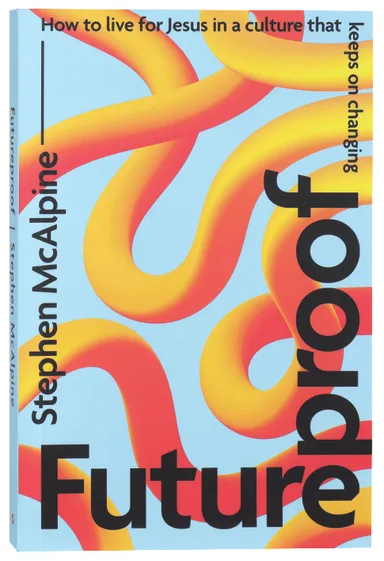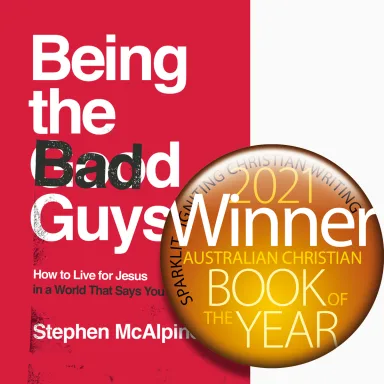Is the church ‘futureproof’?
Yes.
There you go. That must be a record for the fastest an article has ever answered the headline question.
“I do know for a cast-iron fact that the church is futureproof,” writes Stephen McAlpine in his forthcoming book Futureproof.
That sentence comes not in the afterword of the book, but in the introduction.

Futureproof, by Stephen McAlpine
So how can McAlpine go on for eight action-packed chapters when he has given away the answer at the beginning?
Because his goal is to demonstrate not only why the church is futureproof, but also how that conviction can prepare us for “whatever twists and turns our culture takes in the next 30, 50 or 100 years.”
A cultural revival

Being the Bad Guys, by Stephen McAlpine
Even in the few years since McAlpine’s previous book, Being the Bad Guys, much has changed. Part of his goal in that book was to encourage Christians to “buckle in” for a bumpy ride.
Yet McAlpine is hopeful: “I see green shoots of revival. People are starting to revisit transcendence. I don’t think Richard Dawkins and his ilk are the future. New Atheism seems old and dead now.”
“There’s a crisis of meaning and a spiritual renewal that’s heading in a couple of directions. One seems to be a ‘commodification spirituality’ – piecing things together. But there’s also a return to the more ‘crunchy’ versions of Christianity. Because it’s historical, Christianity has weight to it that many other things don’t.”
McAlpine notes a renewed interest in Orthodoxy, Roman Catholicism and older versions of Protestantism, as people are “looking for something solid to land on.”
While baby boomers aimed to present their churches like “a seamless shift from the mall on Saturday to the ‘Sunday mall’ of the big megachurch experience”, McAlpine notes, contemporary seekers want something different; “something that doesn’t just feel like a veneer of spirituality over a modern life.”
A critical role
In fact, McAlpine believes the church has a critical role to play in the spiritual and cultural context of the West. In these two books, McAlpine explores polarization, community, forgiveness, purpose, technology, culture wars, ecology, sexuality, diversity, victimisation and more. On such crucial and hot-button issues, he thinks the Christian church can make an immense impact for good (if we play our cards right!).
As some of those topics demonstrate, our context is different from the context of previous generations in significant ways. One way of framing this change is that we no longer, like the early church, present the gospel as the true and best option among a marketplace of gods. Instead, we preach the gospel of Jesus Christ in the context of a rival gospel!
“It’s good news, but it doesn’t deliver.” – Stephen McAlpine
Here is McAlpine’s summary of this secular gospel: “The goal of your life is to find out your true inner authentic self and express that to the world.”
According to this worldview, the ultimate search is within (not upward), the ultimate authority is the authentic self (not God), and the ultimate Good News is that you are free to live out ‘your truth’, calling out anyone who gets in the way (not that Jesus died to save you from your sin and into the family of God).
“It’s a gospel,” McAlpine concludes. “It’s ‘good news’, but it doesn’t deliver all the time.” As evidence, he points to the skyrocketing levels of anxiety in the West, as we are each crushed by the weight of being the centre of our own universes.
The new old problem
In one sense, McAlpine notes, this is “the age-old issue from the garden”, when Adam and Eve expressed their own desires, directly disobeying God.
But in another sense, this is the result of a cultural revolution. Citing Dale Kuehne, McAlpine notes that “the traditional world was a series of relationships of mutual obligation, and now the only obligation we have is to ourselves, to express ourselves authentically.”
He gives the example of a married person who falls in love with another person of the same sex. Previously, duty was considered owed to one’s partner. Now duty is considered owed to one’s self. Leaving one’s marriage (like British TV presenter Phillip Schofield) and embracing this new partner of the same sex will largely be celebrated by our culture, unlike any previous one. The “authenticity gospel” and “hyper-individualism” has completely reshaped our perception of relationships.
“The great irony of the gospel is that you actually find yourself when you lose yourself in the service of other people.” – Stephen McAlpine
Staying on the narrow path
While McAlpine does not want to go back to the traditional world (he seems less than enthusiastic about the prospect of arranged marriages), he is concerned that, in perhaps subtler ways, this rival gospel has seeped into the Christian church.
How often do we come to church with the mindset of a consumer? Are we disciples of our culture or of Jesus?
“The great irony of the gospel,” McAlpine marvels, “is that you actually find yourself when you lose yourself in the service of other people.”
He is quick to add that the solution is not to burn ourselves out with ‘ninja Christianity’, but to take small and steady steps in a life of self-sacrificial love. “In that you’ll find life; in that you’ll find deeper, richer relationships.”
McAlpine gives the example of forgiveness: rather than ditch the church because you’ve fallen out with a member, we ought to learn to forgive – to be a community of grace as children of the God of all grace.
The futureproof church
So, with all that said, what will the futureproof church look like? How will it engage with our hostile-but-also-hungry culture?
The first step, says McAlpine, is to acknowledge that we might not “win”.
Many Christians consider the ultimate goal of cultural engagement to be winning cultural ground, and are “quite scornful of Christianity that says, ‘Can we just dial down the culture wars?'” But McAlpine thinks not only that the ship of cultural domination has sailed, but also that it was a bad idea in the first place.
In fact, he thinks we might make a bigger splash by using popular voices like Louise Perry and Jordan Peterson as springboards to reach people who might otherwise be hostile or apathetic, reclaiming the Biblical wisdom which is often passed off as secular, and adding to it the beauty of a gospel framework.
In short, the better way, says McAlpine, is ‘suffer now; glory later’ – acknowledging that we will face hardship and even persecution in this world, but it is nothing compared to hearing the words, “Well done, good and faithful servant.”
The futureproof church will be focused on imitating the Lord Jesus.
In this spirit, the futureproof church will be open, hospitable and vulnerable. It will be full of new believers who are starting from scratch in their knowledge of the faith, not having grown up in an overtly Christianised culture.
It will be full of ‘thick’ communities, with strong distinctions about how to practice discipleship, communicated with both clarity and grace. It will be less busy, with so many Australians living in expensive and fast-paced cities, but full of thick and intentional relationships. It will be inter-generational, steady and compelling.
The futureproof church might face suffering now, but it will keep moving forward, with the certain hope of glory later. The futureproof church will be focused on imitating the Lord Jesus – not chasing after self-fulfilment and self-expression, but practicing self-denial and self-sacrifice for the sake of others, trusting our Heavenly Father to come through for us in the end.
I can’t wait to see it.


